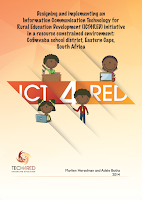BOOK:
Designing and implementing an Information Communication Technology for Rural Education Development (ICT4RED) initiative in a resource constrained environment: Cofimvaba school district, Eastern Cape, South Africa
Marlien Herselman and Adele Botha
This work is licensed under the Creative Commons Attribution-Non
Commercial-No Derivatives 4.0 International License. To view a copy of this
license, visit http://creativecommons.org/licenses/by-nc-nd/4.0/.
Cite
Herselman, M. & Botha, A.
(2014). Designing and implementing an
Information Communication Technology for Rural Education Development (ICT4RED)
initiative in a resource constrained environment: Cofimvaba school district,
Eastern Cape, South Africa. Pretoria, South Africa: CSIR Meraka.
ISBN: 978-0-7988-5618-8 (hbk)
ISBN: 978-0-7988-5619-5 (ebk)
Executive summary
This book is a representation of the activities, which were
recognised as essential components to be considered, when implementing a
certain ICT4D initiative in a resource constrained area in the poorest province
of South Africa which is faced with significant educational challenges. This intervention
was coined the ICT4RED initiative and was a research, development and
implementation project that changed the way in which teachers teach with
technology in their specific context over a period of 3 years (2012-2015).
The book aims to provide an overview of the design and
implementation of an Information and
Communication Technology for rural education development initiative in a
resource constrained environment.
Various frameworks, models, guidelines and tools were
developed by adopting Design Science Research as the chosen methodology.
Certain specific case study phases were applied within the Design Science
Research process and lessons were learnt in each phase which was documented as
the initiative moved from one phase to the other. Certain steps were followed
during each phase. The book provides an overview of how each of the components,
within the ICT4RED Implementation
Framework (Section 2), were managed and how they were operationalised to
provide specific deliverables or to reach certain aims.
The core team (one representative from each component) met
once a week to track and trace progress and deliverables. What emanated from
this ICT4RED initiative was far more than just frameworks, models, processes or
tools, to be tested and refined, it was a change
in the way 350 teachers (in 26 schools) applied technology and teaching
strategies to support their teaching and learning and to improve their 21st
century teaching skills. This initiative can be viewed as a successful
intervention within a specific period of time involving specific people in a
specific context where technology was deployed to support education.
What became evident from this initiative was that it was NOT
about the technology, but about the PEOPLE who are empowered to use the
technology in order to improve their lives and that of their learners!
This book will guide readers through the journey of this
initiative and it is hoped that it will inspire all new prospective students,
teachers and academia to realise that the value of using technology does not lie
in that it can ever replace the teacher, but that it can enhance teaching and learning and transform traditional teaching methods in a classroom. This transformation
can only be successfully done where technology is earned and not just given away
or provided free of charge.
The book is divided into Sections (1-9). Section 1 provides the Introduction and
Background to the ICT4RED initiative and describes how the ICT4RED Framework evolved and how it was adapted after
every phase. The methodology, which underpinned the development of the
framework, is also dealt with.
Section 2 delivers an overview of the ICT4RED Implementation Framework, as one of the key artefacts to
describing the ICT4RED initiative.
Section 3 summarises
how Teacher Professional Development (TPD) was developed and deployed.
Section 4 covers
the importance of the Monitoring and Evaluation framework and how it was
applied in the ICT4RED initiative, over a period of 3 years. It is not the
intention to focus on results but to share how
the M&E framework was used to obtain results and effect impacts.
Section 5 provides
details regarding Initiative Management, Operations Management and School ICT. The
focus is on how the ICT4RED
initiative applied different processes, used certain tools and actioned suppliers
to equip schools and teachers in the Cofimvaba school district.
Section 6
addresses the ways in which Change Management and Stakeholder Management
contributed to the integration of technology in a resource constraint community
in a specific context.
Section 7 focuses
on Sustainability and how value is derived through improved decision-making.
The issue of sustainability, and how it plays an important role in the ICT4RED
initiative, is discussed. Total Cost of Ownership-, Cost utility- and Tablet
selection-models, which were developed to address sustainability, are also
discussed.
Section 8 deals
with the use of social media in the management of the ICT4RED initiative. The
Twitter and WhatsApp feeds (over a period of time) were analysed and provided
some interesting results.
Section 9
provides a synthesis in which the objectives and aims, and how these were
achieved, are addressed. This last section also looks at changes, which were
eminent in the context of the initiative, and ends with some recommendations
for similar future endeavours.


Just tried downloading the book from three different internet browsers and I keep getting an error. Can I get some help because I'm particularly interested in Section 7 about the sustainability of the project.
ReplyDeletePls contact me at the CSIR and I will try assist
DeleteJust tried downloading the book Im keep getting an error
ReplyDeleteIndeed, any attempt to download the book just gives an error message, even if you have filled in the form. It also holds for the other publications that are apparently hosted somewhere in the CSIR research space.
ReplyDeleteHI all, I have updated the link.... go and download!
ReplyDelete